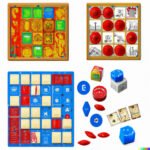Board games have stood the test of time as beloved pastimes, providing hours of entertainment and fostering social interaction. Whether played on a rainy afternoon with family or at competitive gatherings with friends, these games have the power to bring people together and create lasting memories. In particular, classic board games for four players have always been a favorite choice, offering an optimal balance between competitiveness and camaraderie.
There is something nostalgic about gathering around a table with friends or family members, carefully strategizing and engaging in friendly banter over the roll of dice or the placement of tokens. Classic board games provide an opportunity to disconnect from screens and immerse oneself in tactile experiences that stimulate both the mind and heart. The popularity of these games endures year after year because they offer timeless enjoyment and foster strong connections between players.
Whether you enjoy challenging your negotiation skills in Monopoly, flexing your word prowess in Scrabble, or testing your detective abilities in Clue, classic board games for four players offer a wealth of benefits. Not only do they promote face-to-face interaction and bonding, but they also provide intellectual stimulation and strategic thinking opportunities.
Plus, playing with four people creates a dynamic playing field where alliances can be formed, rivalries can be sparked, and unexpected twists can occur at any moment.
So if you’re looking to spend quality time with loved ones or simply unwind after a long day while engaging in friendly competition, look no further than classic board games for four players. These timeless endeavors have endured through generations for good reason-they combine fun with mental agility and create experiences that can’t be replicated through digital means.
Let’s dive into the world of iconic favorites like Monopoly, Risk, Scrabble, Clue, Trivial Pursuit, and The Settlers of Catan to rediscover what makes these games so cherished and why they continue to unite people across generations.
Benefits of Playing Classic Board Games for 4 People
Classic board games have been a staple of family entertainment for generations. From the strategic thinking required in games like Risk and Settlers of Catan, to the word-forming skills tested in Scrabble, these games offer a wide range of benefits for players of all ages. One particularly rewarding aspect of classic board games is playing with four people. This section will explore the benefits of playing classic board games specifically with four players.
Playing classic board games with a group of four people enhances the overall gaming experience in several ways. Firstly, it allows for increased social interaction and bonding. With four players, there are more opportunities for conversation, negotiation, and competition. This can foster stronger relationships among friends or family members as they engage in friendly banter and strategize together.
Additionally, playing with four players adds an extra layer of complexity and challenge to the gameplay. It requires players to think strategically not only about their own moves but also about the actions and decisions made by each opponent. The dynamics between four players create a more dynamic environment where unexpected alliances form and new challenges arise.
Research has shown that playing board games offers numerous cognitive benefits as well. According to a study published in Frontiers in Psychology, board game play stimulates brain activity related to memory formation and cognitive skills such as reasoning and problem-solving. These cognitive benefits are further enhanced when playing with four individuals, as it necessitates heightened attention and critical thinking.
To summarize, playing classic board games with four people brings unique advantages by enhancing social interaction, fostering stronger relationships, adding complexity to gameplay dynamics, and stimulating cognitive skills. Whether it’s engaging in fierce negotiations during Monopoly or collaborating on winning strategies in Risk or Settlers of Catan, these timeless games offer endless opportunities for fun and growth.
| Benefits | Classic Board Games for 4 People |
|---|---|
| Social Interaction | Fosters strong relationships and encourages conversation and negotiation. |
| Gameplay Complexity | Requires strategic thinking about opponents’ moves and alliances. |
| Cognitive Stimulation | Enhances memory, reasoning, and problem-solving skills. |
Monopoly
Monopoly is one of the most iconic classic board games that has been enjoyed by generations. It is a game that combines luck, strategy, and negotiation skills, making it an engaging and addictive experience for four players. With its rich history and enduring popularity, Monopoly has become a staple in households around the world.
The objective of Monopoly is to become the wealthiest player by buying, renting, and selling properties. Each player starts with a set amount of money and takes turns rolling dice to move around the board. When landing on a property, players have the opportunity to purchase it, if available. If another player already owns the property, rent must be paid.
Strategies in Monopoly are crucial for success. One key tactic is to acquire a variety of properties across different color groups to increase opportunities for rental income. Another strategy is to build houses and hotels on properties owned to maximize rental fees. However, careful financial planning is essential as unexpected expenses such as taxes or landing on other players’ properties can quickly deplete your funds.
To make the game more enjoyable, it’s important to establish some house rules or variations that suit your group’s preferences. For example, you can introduce “free parking” as a space where players collect money from various fees throughout the game. Additionally, auctions can be held for unclaimed properties rather than leaving them vacant.
Monopoly provides hours of entertainment and friendly competition while also teaching valuable life skills such as negotiation, decision-making under uncertainty, and financial planning. So gather three other players and prepare for an exciting journey through this classic board game that never fails to create lasting memories.
Risk
Risk is a classic board game that has been captivating players for decades. It combines elements of strategy, negotiation, and luck to create an intense and engaging gameplay experience. With its historical significance and intricate gameplay, Risk has become the ultimate strategy game for 4 players.
In Risk, players take on the role of world leaders vying for global domination. The objective of the game is to conquer territories by strategically placing and moving armies across the map. The world map is divided into different continents and territories, each with its own strategic importance and number of armies required for control.
The gameplay in Risk revolves around careful planning and decision-making. Players must consider factors such as troop placement, fortifications, alliances, and calculated risks when attacking or defending territories. Negotiations with other players also play a crucial role in forming temporary alliances and forging strategies against common opponents.
To succeed in Risk, players need to think critically, analyze different scenarios, and adapt their strategies based on changing circumstances. It requires not only tactical thinking but also diplomatic skills to negotiate deals with other players that can help achieve mutual goals or gain valuable support.
Risk offers endless possibilities for strategic thinking and creates a dynamic environment where alliances can shift at any moment. It challenges players to weigh the potential rewards against the risks involved in every move they make. With its blend of skill, cunning, and a touch of luck, Risk remains unmatched as the ultimate strategy game for 4 players.
Whether you’re a seasoned veteran or new to board games, Risk provides an exciting and immersive experience that will keep you coming back for more. So gather your friends or family members and embark on an epic journey of global conquest in this timeless classic board game.
Scrabble
Scrabble is a classic word game that has been entertaining and challenging players for decades. With its simple yet engaging gameplay, Scrabble is the perfect choice for a group of four people looking to test their vocabulary skills and have fun at the same time.
The rules of Scrabble are fairly straightforward. Each player starts with a set of letter tiles, drawn randomly from the bag, and takes turns creating words on the game board. Words can be formed horizontally or vertically, intersecting with existing words to create new ones. Each letter tile has a different point value, and players must strategically place their tiles on bonus squares to maximize their score.
Scrabble not only provides hours of entertainment, but it also offers educational benefits. Playing this word game helps improve vocabulary, literacy skills, and critical thinking abilities. It challenges players to think creatively as they form words with limited resources and strategize where to place them on the board for maximum points.
To excel at Scrabble, players should familiarize themselves with high-value letters such as “Q,” “X,” and “Z” as well as two-letter words that can be used strategically to connect multiple words together. Additionally, learning prefixes and suffixes can significantly expand one’s ability to form longer words.
| Letter | Value |
|---|---|
| A, E, I, O, U, L, N, R, | 1 |
| S,T | 1 |
Scrabble is a timeless classic that brings people together through the power of words. Whether you’re challenging friends to a friendly competition or enjoying a family game night, Scrabble is sure to provide endless fun and intellectual stimulation for all players involved. So grab your letter tiles, start forming words, and let the battle of wits begin.
Clue
Clue, also known as Cluedo in some countries, is a classic board game that has captured the imaginations of players for decades. In this thrilling detective-themed game, four players work together to solve a murder mystery by collecting clues and deducing the murderer, weapon, and location. With its intriguing premise and suspenseful gameplay, Clue provides an immersive experience for all.
The rules of Clue are simple yet engaging. Each player takes on the role of a character and moves around the game board, entering different rooms to gather information. By making suggestions and eliminating possible suspects, weapons, and locations, players narrow down the possibilities until they can confidently make an accusation. The objective is to be the first player to correctly identify all three components of the crime.
To excel at Clue, players must exercise their deduction skills and logical reasoning. They need to pay close attention to their opponents’ moves and responses as well as make strategic choices about which rooms to enter and which cards to suggest. Communication and collaboration with other players are essential for maximizing chances of solving the mystery efficiently.
While Clue may seem like a game of chance at first glance, experienced players know that it requires careful planning and analysis. Developing effective gameplay strategies such as making optimal use of secret passages or targeting specific rooms for investigation can greatly enhance one’s chances of winning. Additionally, understanding probability and keeping track of previous suggestions is crucial in determining what cards potential suspects possess.
In summary, Clue is a timeless classic that continues to captivate board game enthusiasts around the world. Its blend of strategy, deduction, and interpersonal dynamics make it an ideal choice for four sleuths looking for an exciting gaming experience. Whether you’re playing with family or friends, Clue offers endless hours of fun while exercising your cognitive abilities along the way. So grab your magnifying glass and detective hat, and immerse yourself in the mysterious world of Clue.
Trivial Pursuit
Trivia games have always been a crowd favorite when it comes to classic board games. Trivial Pursuit, one of the most well-known and beloved trivia games, has been entertaining players for decades. With its challenging questions and competitive edge, Trivial Pursuit is the ultimate game for four knowledgeable players.
Detailing the Trivia Categories and Question Formats
Trivial Pursuit covers a wide range of categories, making it appealing to players with various interests and areas of expertise. From history and geography to science and entertainment, this game tests players’ knowledge in almost every imaginable category. Each category is color-coded and represents a different area of knowledge. This adds an element of variety and ensures that no two games are the same.
The question formats in Trivial Pursuit vary as well. Some questions require multiple-choice answers while others are open-ended or true/false. This diversity keeps players on their toes and forces them to think critically in order to answer correctly. The unpredictable nature of the questions makes each turn exciting as players rack their brains to recall obscure facts or test their luck with educated guesses.
Explaining the Objective and Rules
The objective of Trivial Pursuit is simple: collect all six pie-shaped wedges by correctly answering questions from each category. Players take turns rolling a die, moving around the board, and answering questions based on the category they land on. If they answer correctly, they earn a wedge for that category; if they answer incorrectly, play passes to the next player.
To add an extra layer of challenge, certain spaces on the board allow players to challenge their opponents’ knowledge or even steal wedges from them if they answer incorrectly. This strategic aspect adds excitement as players strategically plan their moves based on which categories they need to complete their collection.
Sharing Strategies for Success
To excel at Trivial Pursuit, it is essential to have a range of general knowledge, but strategic thinking can also give players an edge. One effective strategy is to focus on weaker categories during the game. By actively seeking questions in their areas of strength, players can increase their chances of collecting wedges and gaining an advantage over opponents.
Additionally, utilizing the game pieces strategically can play a role in success. Players can aim to strategically position themselves on certain spaces to gain advantages or avoid challenges from opponents. This requires careful planning and weighing the potential risks and rewards of each move.
The Settlers of Catan
Introduction to Game
The Settlers of Catan, often referred to simply as Catan, is a modern classic board game that has taken the gaming world by storm since its release in 1995. Designed by Klaus Teuber, this Euro-style game combines elements of strategy, resource management, and negotiation, making it an engaging and immersive experience for players. The game transports players to the fictional island of Catan, where they must compete with one another to build settlements and expand their territories.
Unique Mechanics and Trading Elements
One of the key aspects that sets The Settlers of Catan apart from traditional board games is its unique mechanics. The game board is composed of hexagonal tiles representing different types of resources such as wood, brick, wheat, ore, and sheep. Players take turns rolling dice to determine which resources are produced each round. This element of chance adds excitement and unpredictability to the game.
In addition to resource production and expansion through settlement building, trading plays a crucial role in The Settlers of Catan. Unlike many other board games, players are encouraged to negotiate with one another in order to secure the resources they need for their strategies. This creates a dynamic social aspect as players bargain and trade with one another to gain an advantage.
Strategic Resource Management and Building Settlements
Success in The Settlers of Catan hinges on strategic resource management. Each player starts with two settlements placed on intersections between resource tiles. These settlements generate resources when the corresponding numbers are rolled on dice. Players must carefully consider which resources they prioritize based on their initial placement and future plans.
Building roads and additional settlements allows players to expand their influence across the island. Strategic placement plays a crucial role as players strive for control over favorable resource locations or attempt to cut off opponents’ access. Balancing immediate needs with long-term strategies is essential for success in The Settlers of Catan.
Ultimately, The Settlers of Catan offers a unique and immersive gaming experience that combines strategy, resource management, negotiation, and friendly competition. Its modern classic status attests to its enduring appeal and continued popularity among board game enthusiasts around the world. If you’re looking to gather three friends and embark on an exciting journey of settlement-building and trading, The Settlers of Catan is a must-try game that is sure to create memorable moments.
Conclusion
In conclusion, classic board games for 4 people have stood the test of time and continue to captivate players of all ages. These games offer a unique opportunity to engage in face-to-face interaction and bond with family and friends. The benefits of playing these classic board games are numerous, both in terms of cognitive skills and social development.
Playing classic board games with 4 people enhances the experience, as it allows for dynamic gameplay and strategic thinking. Whether it’s the negotiation skills required in Risk, the word formation strategies in Scrabble, or the deduction and logic exercises in Clue, these games challenge players to think critically and creatively. Moreover, playing together stimulates healthy competition and cooperation, fostering teamwork and problem-solving abilities.
Beyond their inherent educational value, classic board games also have an unparalleled ability to bring generations together. Sharing the joy of rolling dice, making deals, or unraveling mysteries creates lasting memories that transcend age gaps. Whether it’s grandparents passing on their favorite childhood game or parents introducing their children to timeless classics like Monopoly or Trivial Pursuit, these interactions promote meaningful connections between loved ones.
In a world increasingly dominated by technology and screens, rediscovering the joy of classic board games can be a breath of fresh air. So next time you gather around a table for game night, consider dusting off some old favorites. With laughter, competition, learning opportunities, and quality time spent together as cherished outcomes, classic board games truly unite generations while providing endless hours of fun entertainment.
Frequently Asked Questions
What are some old board games?
Some old board games that have stood the test of time include classics like Chess, Backgammon, and Checkers. These games date back centuries and have been enjoyed by generations of players.
Other examples of old board games include Mancala, a game originating from ancient Egypt, and Go, a strategic game developed in China over 2,500 years ago. These timeless games have provided endless hours of entertainment for people throughout history.
What is the most popular traditional board game?
While opinions may vary depending on cultural preferences and regional popularity, one traditional board game that has achieved widespread recognition as the most popular is Chess. Chess is a strategic game that originated in India around the 6th century AD and has since spread across the globe.
It is played by millions of people worldwide and is known for its intellectual challenge and depth. With its complex rules and emphasis on planning ahead, Chess continues to captivate players of all ages and remains a staple in the world of traditional board games.
What is the most loved board game?
Determining the most loved board game can be subjective, as individual preferences differ greatly among players. However, one board game that consistently earns high praise for its universal appeal is Monopoly. Monopoly was first published in 1935 and has since garnered a loyal following around the world.
The game allows players to engage in fierce competition as they buy properties, charge rent, negotiate deals, and strive to bankrupt their opponents. Its blend of luck and strategy provides an enticing mix that attracts players of all ages and encourages friendly rivalry amongst friends and family members alike. With numerous editions featuring different themes and variations released throughout the years, Monopoly continues to be cherished by many as a beloved classic board game experience

I love playing all kinds of games – from classics like Monopoly to modern favourites like Ticket to Ride.
I created this blog as a way to share my love of board games with others, and provide information on the latest releases and news in the industry.





